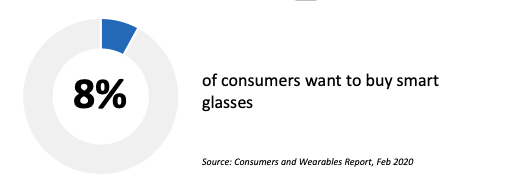
North acquired by Google
North, which makes the Focals smart glasses, has been acquired by Google. As part of the move, North will be winding down production of its first generation of Focals, and will no longer be launching Focals 2.0. That leaves a short-term void in the smart glasses space, but one would hope that it’s a sign of renewed interest in the category by Google. While the Focals remained a niche product since launch, it offered the hint of a future interface that could give smartwatches a run for their money. As such, it will be interesting to see what Google does with the technology moving forward. Having said that, the category is struggling to gain traction: Bose shut down its AR glasses program in June too.
The NPD Take:
- Smart glasses have failed to take off to date, but we still feel that this is a strong future interface once someone gets it right. And North got closer to that objective than any other player so far (including Google). Clearly it’s a category with a future, especially with Apple rumored to be working on its own variation. As such, it will be interesting to see what Google does in the next 12 months.
- We suspect that North simply ran out of runway (dollars) in their ramp up. Building an innovative product is one thing… getting it into retail was quite another and it’s likely that the company misjudged the cost, and time, it would take to ramp up retail demand.
Dick Tracy, meet Qualcomm
While the smart glasses space may be struggling, watches continue to grow in importance. And the next boost to the watch category comes with Qualcomm’s new Snapdragon Wear 4100 platforms with faster processing and lower-powered cellular connectivity. It may be 4G cellular, but seriously, the use case for 5G is a little questionable on a watch any time soon. The real key here is 25 percent power reductions which will bring a much-needed extended battery life to the watches. In addition, the platform focuses on improved colors (now 64K) as well as video messaging capabilities for the Dick Tracy’s among us.
The NPD Take:
- Faster chipsets with lower power demand: what’s not to like. And, most importantly, lower-powered 4G connectivity to truly boost the smartwatch’s capabilities. Carriers will be salivating about the opportunities to upsell current customers.
Polar looks for new blood
Polar, which is best known for wearables aimed at the serious exerciser and athlete, is looking for new blood. Specifically, the company has launched Polar Unite, a lower-priced smartwatch ($150) that still packs an array of solid exercise features and functionality. Animated instructions show you what particular exercises look like while the device has a range of real-time training stats to keep you motivated. Of course, what will motivate the most is that price point… well below the usual range for the top-branded smartwatches such as Garmin.
The NPD Take:
- Polar’s logic is that, with us all stuck at home and far away from a gym, now is the perfect time for a watch that can get us back on track. While we cannot necessarily fault the logic, the reality is that demand for smartwatches has dropped during the pandemic as many consumers look at it as a nice to have, rather than a must have. Of course, at just $150, Polar may have found the correct balance to help drive sales.
- Due to the lower demand that we’ve been seeing, many smartwatches are on sale. The Apple Watch series 3, for example, is often spotted on sale for sub-$200, which provides some obvious competition even at this low price.